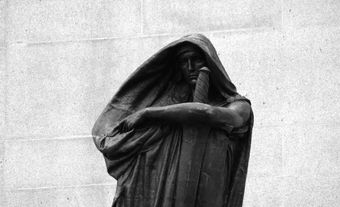This article was originally published in Maclean's Magazine on May 9, 2005
Robert St-Onge never meant to become a proxy for everyone who feels like he got taken to the cleaners in the advertising scandal, and when his moment in the spotlight came, he made no attempt to hide his vile mood. But sometimes perfectly innocent people wind up in the wrong place at the wrong time. It was St-Onge's name that showed up on many of the fake invoices that made other people rich on taxpayer dollars. St-Onge didn't do the work. He never saw a dime of the money. When the depth of the creative accounting was revealed to him - with Justice John Gomery and much of the country watching his reaction - he was not a happy camper.
St-Onge is a freelance creative director in Montreal's bustling advertising industry. For several years he worked on contract with Paul Coffin, an adman who is facing fraud charges in the Adscam affair and who had a rough couple of days on the witness stand last week. Coffin's testimony amounted to a reluctant but, in the end, detailed confession that he had submitted fake invoices in return for much of the $2.7 million he pocketed from the sponsorship program, beginning in the late 1990s. The week's biggest revelation was that Coffin did the faking under instructions from his friend Chuck Guité, the now-retired Public Works bureaucrat who was the program's kingpin.
That's right: if Coffin was working a scam to pocket your tax dollars, he was doing it, by his own account, with help from Guité. And if Coffin ever forgot to dip into the public trough, he was reminded with a helpful phone call from Ottawa. Every March, near the end of the budget year, the phone at his Montreal firm would ring. The call would come, he told Gomery, "from somebody at Public Works, saying, 'There is still so much in the budget. Are you sending more invoices?' We would immediately send more invoices to complete the budget." Anyone who's worked in a bureaucracy recognizes what's going on here. Gomery asked Coffin: the goal was to use up Guité's entire budget allocation before the fiscal year ran out? Coffin agreed. And how would he do that? "We would create invoices," Coffin said.
We'll get back to Coffin shortly, but if you're angry at the thought of an annual call from Ottawa asking for more fake invoices, imagine how St-Onge felt to see his name on them.
St-Onge is lean and fashionably scruffy in a very Montreal way. He was soft-spoken during his brief testimony, but the more he talked the more he did a slow burn. St-Onge had come up with a concept for sports infomercials that romanticized the lives of Canadian Olympic athletes. Coffin found him corporate funding and, of course, taxpayer funding through the sponsorship program. St-Onge billed, and was paid, $13,400 for all this work. But Communication Coffin netted $115,000, by billing for work nobody had done. And it wasn't until last week, as Marie Cossette, a member of the inquiry team, walked St-Onge through the company's books, that the creative man realized he was the victim of creative accounting.
St-Onge was so upset he was briefly propelled into the third-person singular. "Did you know Mr. Coffin was pocketing that kind of money from your concept?" Cossette asked him. "No ma'am. And Monsieur is not pleased that it is so," St-Onge said. Gomery asked: "Have you learned something?" "Absolutely," St-Onge replied, returning to the first person and a semblance of composure. "I got taken. Everybody seems to have made money off my concept except me!" Gomery smirked the particularly mournful smirk that has become one of his trademark expressions. "We won't even tell you how much Lafleur made," he said, referring to another agency that had profited from St-Onge's diligence and naïveté. "That would be a whole other ..." St-Onge cut him off. "I have a bad enough case of hives as is, Mr. Commissioner. Thank you. Incredible!"
It was a rare moment at these hearings: the testimony of a man who appears to be entirely innocent. He was a refreshing contrast after such a parade of people whose claims to innocence - or its trusty sidekicks, forgetfulness and naïveté - are so hard to square with the documentary evidence.
Testifying under a publication ban that Gomery lifted soon after he left the stand, Coffin toyed fitfully with all those dodges before Cossette and Gomery backed him so briskly into a succession of evidentiary corners that he found himself repeatedly forced to come clean. Each time, Coffin - whose round face now carries a semi-permanent expression of worry - folded in on himself like a deflating balloon. He got richer from the sponsorship imbroglio than he has ever been, and he now wishes he had never been struck with such cursed good luck.
It has become popular to talk about the "Liberal-friendly ad agencies" at the centre of Adscam, but Coffin was a "very active" Progressive Conservative, and he was friendly with two men in Ottawa: Guité, and Guité's successor as the sponsorship program's main administrator after 1999, Pierre Tremblay. Guité was already an influential member of the public service when he lined up advertising contracts for Coffin with the Mulroney government of the late 1980s and early 1990s. The two dined frequently. Coffin ended up buying Guité's pleasure boat.
Coffin said it was Guité who, from "day one" of the sponsorship program, told him to submit invoices for hours nobody had worked. Getting this information from Coffin took several minutes of stern questioning from Gomery as he pushed Coffin through several lines of defence. "I was stupid, plain stupid," Coffin offered, weakly.
No good. "But who was asking you to bill in this way?" Gomery asked. Coffin tried vagueness. "For the time being, I will say the department" - that is, the federal Public Works Department. No dice. "Yes, but the department doesn't have a voice," Gomery said. "You know, Mr. Coffin, if you are finding it awkward here today and you have got yourself into a lot of trouble, it is because somebody led you astray. And I would like to know who that person was." Coffin folded. "Mr. Guité."
All of this is the long way of saying why Guité's testimony, which began last week under its own publication ban, is so crucial to Gomery's work. A very large amount of skulduggery and profiteering has been parked at the retired bureaucrat's door. So far, relatively little has got past it to Guité's political bosses. If Guité boots responsibility for the fake invoices and the misspent millions up to his political bosses in Chrétien's PMO, then, as bad as this has been for Paul Martin's government, it can only get far worse.
Witnesses after Guité will include representatives of the forensic auditing firm Gomery himself hired to follow the Adscam money trail: Kroll Lindquist Avey. But here is something puzzling: last week, two sources said that, after all these months, Kroll's accountants haven't yet visited the Liberal Party of Canada's offices. Perhaps they think that relatively little of the Adscam money that lined the pockets of private-sector profiteers wound up in the party's accounts. Or perhaps they were simply arming to the teeth before laying siege to the Liberal books. The Gomery commission's most intriguing revelations are still ahead.
See also Corruption.
Maclean's May 9, 2005

 Share on Facebook
Share on Facebook Share on X
Share on X Share by Email
Share by Email Share on Google Classroom
Share on Google Classroom


